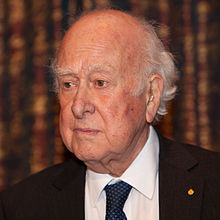Peter Higgs
| Peter Higgs | |
|---|---|

Nobel laureate Peter Higgs at a press conference, Stockholm, December 2013
|
|
| Born | Peter Ware Higgs 29 May 1929 Newcastle upon Tyne, England |
| Residence | Edinburgh, Scotland |
| Nationality | British |
| Fields | Physics (theoretical) |
| Institutions |
University of Edinburgh Imperial College London University College London King's College London |
| Alma mater | King's College London |
| Thesis | Some problems in the theory of molecular vibrations (1955) |
| Doctoral advisor |
Charles Coulson H. Christopher Longuet-Higgins |
| Doctoral students |
Christopher Bishop Lewis Ryder David Wallace |
| Known for |
Broken symmetry in electroweak theory Higgs boson Higgs field Higgs mechanism |
| Notable awards |
|
|
Website www |
|
Peter Ware Higgs CH FRS FRSE (born 29 May 1929) is a British theoretical physicist, emeritus professor at the University of Edinburgh, and Nobel Prize laureate for his work on the mass of subatomic particles.
In the 1960s, he proposed that broken symmetry in electroweak theory could explain the origin of mass of elementary particles in general and of the W and Z bosons in particular. This so-called Higgs mechanism, which was proposed by several physicists besides Higgs at about the same time, predicts the existence of a new particle, the Higgs boson, the detection of which became one of the great goals of physics.CERN announced on 4 July 2012 that they had experimentally established the existence of a Higgs-like boson, but further work would be needed to analyse its properties and see whether it had the properties expected from the Standard Model Higgs boson. On 14 March 2013, the newly discovered particle was tentatively confirmed to be + parity and zero spin, two fundamental criteria of a Higgs boson, making it the first known fundamental scalar particle to be discovered in nature. The Higgs mechanism is generally accepted as an important ingredient in the Standard Model of particle physics, without which certain particles would have no mass.
...
Wikipedia
